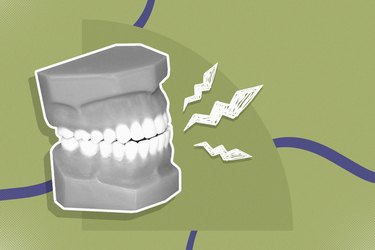
Maybe you find yourself unintentionally clenching your jaw during stressful moments, or while you're engaged in focused activities. Or perhaps your partner has shared that during the night, you grind your teeth together, making unpleasant noises.
This grinding and clenching is known as bruxism, and often, people make these movements in their mouth without even realizing it. (That's particularly true for anyone who grinds at night, while asleep.) Bruxism is more than an annoying habit — untreated, it can lead to an array of disruptive symptoms, including pain, difficulty sleeping and damage to your teeth.
Video of the Day
Video of the Day
"The bite is pretty powerful. Over time, lots of problems can be created," Frederic Barnett, DMD, chairman of the Maxwell S. Fogel Department of Dentistry, tells LIVESTRONG.com.
Bruxism is divided into two varieties: awake and asleep. While sleeping, people with bruxism "may clench down with a force of up to 250 pounds," according to the MSD Manual.
"Many people clench during the daytime. However, the majority of damage and destruction occurs during the nighttime," says Jeffrey S. Haddad, DDS, a dentist in Rochester, Michigan, who specializes in neuromuscular dentistry.
Here's what you need to know about what really happens when you grind and clench.
Why Do People Grind Their Teeth?
While psychological, genetic and physical factors may play a role in bruxism, per the Mayo Clinic, the underlying cause is not entirely clear.
Stress — and other strong emotions like anger and frustration, as well as personality type — plays a role. Dr. Barnett notes that he sees an increase in bruxism-related issues during the holiday season, which can be a stressful time.
It could be that there's something a bit satisfying about grinding, in the same way that some people crunch on ice or chew gum or bite their nails.
“Sometimes in a stressful situation, you want something crunchy,” says Martha Silva, DDS, a dentist at the Chicago-based dental practice Floss & Company. “People tend to forget that every tooth has a nerve going to it. When you put that pressure on teeth, there’s feedback to the brain that gives it some sort of relief."
Other risk factors include age (it’s more common in children than adults), family members with bruxism and certain substances and medications, such as antidepressants, smoking and alcohol use, per the Mayo Clinic.
1. Your Teeth and Fillings Wear Down Faster
There's only one time when your teeth should touch, Dr. Silva says. And that's when you're eating.
"When you're not chewing food, your teeth shouldn't be touching," she says. When your teeth do touch — whether due to clenching or grinding — it leads to "accelerated wear on teeth," she says.
The edges of your teeth, along with the cusp tips, will wear down and flatten, Dr. Barnett says. And things can start to break: Bruxism can lead to chipped fillings, fractured teeth and crowns that are damaged or knocked off the tooth, Dr. Silva says.
2. Your Teeth May Also Feel Sensitive
Bruxism can lead to tooth sensitivity — eating foods that are hot or cold, as well as sweet foods, may feel uncomfortable and painful, Dr. Barnett says. This is the result of the protective enamel wearing away, exposing parts of the tooth (like the dentine) that are more sensitive.
Teeth may even become sensitive to air.
"I have patients who run outside and can't take the wind blowing against their face because their tooth is so sensitive," Dr. Silva says.
Or, she notes, people may feel shivers down their spine when their toothbrush bristles scrape against the surface of eroded teeth.
3. Your Head and Face Might Ache
Bruxism can lead to headaches and facial pain, per Johns Hopkins Medicine. Some people will get earaches, per the Mayo Clinic.
Some of the muscles you use to open and close your mouth and chew on food connect at the temporomandibular joint (TMJ), which connects your jaw to your skull, Dr. Barnett explains. Bruxism puts stress on the TMJ. As a result, your jaw may feel sore and you may have pain in front of your ears. Pressure on this joint from bruxism can also lead to TMJ disorders, according to the Cleveland Clinic.
"Bruxism is a sign and symptom of a TMJ disorder, but they are not the same thing," Dr. Haddad says, noting that addressing bruxism can prevent it from progressing to a more serious condition.
If you do have a TMJ disorder, you may hear a clicking or popping sound when opening or closing your mouth — or, you may not be able to fully open your mouth, per the Cleveland Clinic.
4. Your Sleep Could Suffer
"Bruxism may be a red flag for sleep apnea," Dr. Haddad says. This condition is characterized by a person's breathing stopping and starting during sleep.
"People who clench or grind their teeth during sleep are more likely to have other sleep disorders, such as snoring or sleep apnea," Dr. Haddad says.
One-third of patients with obstructive sleep apnea also have sleep bruxism, according to a summer 2019 study in the Journal of Oral & Facial Pain and Headache.
So there may be some sort of association between sleep apnea and bruxism — although Dr. Barnett points out, there's no cause and effect. That is, just because the two conditions are associated does not indicate the bruxism causes sleep apnea — or vice versa.
It May Mess With Your Partner’s Sleep, Too
If you have sleep bruxism, your partner may be the first to notice.
"It's really loud when someone is grinding their teeth right next to someone," Dr. Barnett says.
And the sounds aren't pleasant. As with snoring, when you grind your teeth, you can make it harder for your bed partner to fall asleep or stay asleep, according to the Sleep Foundation.
How to Stop Clenching Your Teeth

There is no cure for bruxism, unfortunately. But dentists do have a lot of treatment tactics.
1. Wear a Mouth Guard
Mouth guards or bite splints are the go-to recommendations for bruxism, Dr. Barnett says.
"For a lot of patients, this will help. It doesn't stop or cure bruxism, but it protects the teeth from being ground on," he says. And it also alleviates symptoms that accompany bruxism, such as muscle soreness, tooth damage and TMJ issues, he notes.
Over-the-counter mouth guards are available at drugstores. These boil-and-bite options are fairly straightforward to use: You'll put the plastic mouth guard in boiling water, remove it with tongs, then bite into it after it's chilled for a bit, Dr. Barnett explains.
You can also get fitted for a mouth guard at your dentist, which will be made out of a harder, acrylic material, he says.
"Over-the-counter boil-and-bite guards will never fit as well as when it's done [in a dentist's office] by taking impressions and adjusting it in the patient's mouth," Dr. Barnett says.
If you find a night guard effective, you'll want to make wearing it part of your nightly routine, Dr. Silva says. That's because some nights, grinding may be limited, but it's also possible for it to occur hundreds of times in one night, per the American Academy of Sleep Medicine.
2. Change the Way You Hold Your Mouth and Jaw
For people who clench and grind their jaw while awake, becoming aware of the habit — and then adjusting your behavior — is helpful.
To do this, you'll have to get good at identifying the signs that you may be engaged in bruxism, Dr. Barnett says. "As soon as you feel tension in the muscles, that's a sign to relax and chill a bit," he says.
The general rule is that when you're not eating (or speaking), you want your mouth to be closed, teeth apart and tongue positioned behind the front teeth at the roof of your palate, per the Cleveland Clinic. This will help keep your jaw muscles relaxed so you can't clench your teeth.
3. Cut Down on Stress
Stress is a risk factor for bruxism, so engaging in tactics to reduce your stress level is recommended, per the U.S. National Library of Medicine. Consider mindful meditation, Dr. Barnett says. Therapy can also be helpful for people with anxiety-related bruxism, according to the Mayo Clinic.
4. Consider Medications
If the grinding leads to pain — such as headaches and face pain — Dr. Silva recommends taking an over-the-counter anti-inflammatory medication, such as ibuprofen.
Your dentist may also recommend muscle relaxants or having botox injections, per the Mayo Clinic.
And if one of your medications triggers bruxism as a side effect, it's a good idea to ask your doctor for a different medication recommendation.
5. Make a Few Dietary Changes
There's an association between teeth grinding and drinking alcohol, smoking cigarettes and having caffeine, per an August 2016 systematic review in the Journal of the American Dental Association.
So it can be helpful to cut down on caffeine and alcohol before bedtime, per the Cleveland Clinic. (And consider this yet another reason to quit smoking.)
Dr. Silva also tells patients to avoid chewing gum. And if they're struggling to comfortably chew or open their mouths, she recommends a diet of soft foods (think: mashed potatoes, bananas, etc.) to give the muscles time to recover.
- MSD Manual: "Teeth Grinding"
- Mayo Clinic: "Bruxism (teeth grinding)"
- Johns Hopkins Medicine: "Bruxism"
- Cleveland Clinic: "Temporomandibular Disorders (TMD): Overview"
- Journal of Oral & Facial Pain and Headache: "Prevalence of Sleep Bruxism and Its Association with Obstructive Sleep Apnea in Adult Patients: A Retrospective Polysomnographic Investigation"
- Sleep Foundation: "Teeth Grinding"
- American Academy of Sleep Medicine: "Bruxism – Overview & Facts"
- Cleveland Clinic: "Teeth Grinding (Bruxism): Prevention"
- U.S. National Library of Medicine: "Bruxism"
- Journal of the American Dental Association: "Association between sleep bruxism and alcohol, caffeine, tobacco, and drug abuse: A systematic review"
Is this an emergency? If you are experiencing serious medical symptoms, please see the National Library of Medicine’s list of signs you need emergency medical attention or call 911.
